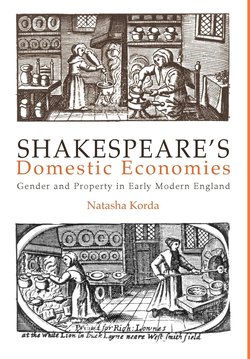Shakespeare's Domestic Economies

Реклама. ООО «ЛитРес», ИНН: 7719571260.
Оглавление
Natasha Korda. Shakespeare's Domestic Economies
Отрывок из книги
Shakespeare’s Domestic Economies
Gender and Property in Early Modern England
.....
Nature … hath geven unto man a noble, a high, & a diligent minde to be busye and occupied abroade, to gayne & to bring home to their wives & familie, to rule them & their children, & also all their houshold. And to the woman nature hath geven a feareful, a covetous, & an humble mind to be subject unto man, & to kepe that he doeth gayne.52
In the latter treatise, directed to husbands rather than wives, the wife’s role as “keeper” is not surprisingly taken to be a sign not only of her “feareful” and “covetous” feminine disposition, but of her natural “subject[ion] unto man.” Any suggestion that her active, managerial role within the household economy may pose a threat to her husband’s authority, much less to his property, has been entirely effaced. We have come a long way indeed from the “manlye stomach” of the housewife who “overse[es] the stuffe, vessell & implementes of [her] house none other wise than the capitaine of a garison overseeth and proveth the soudiers.” While it seems clear that the woman’s role as keeper of household stuff had become central to conceptualizations of female subjectivity in domestic treatises of the period, it is equally clear that these conceptualizations were highly contradictory, suggesting first activity then passivity, labor then leisure, spending then receiving, profligacy then frugality, courage then fearfulness, lusty assertiveness then timid humility, sexual largesse then chary chastity, “manlye” forms of governance and then “subject[ion] unto man.”53
.....